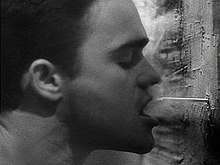Un chant d'amour
Un chant d'amour (French pronunciation: [œ̃ ʃɑ̃ damuʁ]; English: A Song of Love) is French writer Jean Genet's only film, which he directed in 1950.[1] Because of its explicit (though artistically presented) homosexual content, the 26-minute movie was long banned.
| Un chant d'amour | |
|---|---|
 | |
| Directed by | Jean Genet |
| Produced by | Nico Papatakis |
| Written by | Jean Genet |
| Starring | Java André Reybaz |
| Music by | Gavin Bryars (1973) Patrick Nunn (1996) Simon Fisher-Turner (2003) |
| Cinematography | Jean Cocteau |
| Distributed by | Connoisseur Video |
Release date | 1950 |
Running time | 26 min. |
| Country | France |
| Language | No dialogue |
Plot
The plot is set in a French prison, where a prison guard takes voyeuristic pleasure in observing the prisoners perform masturbatory sexual acts. In two adjacent cells, there is an older Algerian-looking man and a tattooed convict in his twenties. The older man is in love with the younger one, rubbing himself against the wall and sharing his cigarette smoke with his beloved through a straw.
The prison guard, apparently jealous of the prisoners' relationship, enters the older convict's cell, beats him, and makes him suck on his gun in a sexual fashion. Following this, the inmate drifts off into a fantasy where he and his object of desire roam the countryside. In the final scene, it becomes clear that the guard's power is no match for the intensity of attraction between the prisoners, even though their relationship is not consummated.
Genet does not use dialogue in his film, but focuses instead on close-ups of bodies, on faces, armpits and penises.
Production
Un chant d'amour was French writer Jean Genet's only film, which he directed. Jean Cocteau was believed to be the film's cinematographer.[2]
Controversy and ban
When in 1966 distributor Sol Landau attempted to exhibit the film in Berkeley, California, he was informed by a member of the local police special investigations department that were he to continue screening it the film "would be confiscated and the person responsible arrested." Landau responded by instituting the case of Landau v. Fording (1966) in which he sought to show Genet's work without police harassment. The Alameda County Superior Court watched the film twice and declared that it,"explicitly and vividly revealed acts of masturbation, oral copulation, the infamous crime against nature [a euphemism for sodomy], voyeurism, nudity, sadism, masochism and sex..." The court rejected Landau's suit, further condemning the film as "cheap pornography calculated to promote homosexuality, perversion and morbid sex practices." He was similarly rebuffed in the District Court of Appeal of California, which accepted that Genet was a major writer but cited this as a lesser work of an early period and declared that in the end it was "nothing more than hard-core pornography and should be banned." When the case reached the U.S. Supreme Court, the decision was confirmed once more, in a 5-4 per curiam decision in which the justices simply stated that Un chant d'amour was obscene and offered no further explanation.
— The Encyclopedia of Censorship[3]
Critical reception
Un chant d'amour was described in The Queer Encyclopedia of Film & Television as "one of the earliest and most remarkable attempts to portray homosexual passion on-screen".[4] Fernando F. Croce of Slant wrote "A revolutionary vision of emancipation through sensuality, Un chant d'amour is a song of love both universal and eternal."[5] Jamie Rich of DVD Talk called it "an effective film, albeit a tad clumsy and pretentious" that is "still a progressive and interesting experiment worth the time one is willing to put into it."[2] Phil Hall of Film Threat was more critical, writing "working in a silent film medium robs Genet of the lyrical language that dominated his artistic genius, and instead he presents a skein of imagery that becomes sillier and sillier as the film progresses. [...] Strictly of curio value, "Un chant d'amour" can offer contemporary viewers little more than some unintentional gay giggles."[6]
The film currently holds an approval rating of 100% on Rotten Tomatoes.[7]
Legacy
The film has been cited as an influence for many gay filmmakers, including Derek Jarman, Andy Warhol, and Paul Morrissey.[8][9]
Cast
- Java
- André Reybaz
- Coco Le Martiniquais as second dancing prisoner (uncredited)
- Lucien Sénémaud (uncredited)
References
- Silver, Charles (26 March 2013). "MoMA | Jean Genet's A Song of Love and Jean Cocteau's Testament of Orpheus". MoMA. Retrieved 26 December 2014.
- Rich, Jamie S. (2 April 2009). "Jean Genet's Un chant d'amour : DVD Talk Review of the DVD Video". DVD Talk. Retrieved 26 December 2014.
- Green, Jonathon; Karolides, Nicholas J. (2005) [1990]. The Encyclopedia of Censorship. Facts on File Library of World History. New York, New York, United States: Facts on File. ISBN 9781438110011. OCLC 241302158. Retrieved 29 July 2012.
- Summers, Claude J., ed. (2005). The Queer Encyclopedia of Film & Television. Ceis Press. p. 109. Retrieved 26 December 2014.
- Croce, Fernando F. "Un chant d'amour | Film Review | Slant Magazine". Slant. Retrieved 26 December 2014.
- Hall, Phil (7 May 2007). "Film Threat – Un chant d'amour". Film Threat. Retrieved 26 December 2014.
- "Un chant d'amour (A Song of Love) – Rotten Tomatoes". Rotten Tomatoes. Retrieved 26 December 2014.
- Dillon, Steven (1 April 2004). Derek Jarman and Lyric Film: The Mirror and the Sea. University of Texas Press. pp. 29–33. Retrieved 26 December 2014.
- Levy, Emanuel. Gay Directors, Gay Films?: Pedro Almodóvar, Terence Davies, Todd Haynes, Gus Van Sant, John Waters. Columbia University Press. p. 168. ISBN 9780231526531.
Further reading
- Giles, Jane. The Cinema of Jean Genet: Un chant d'amour.
- Rothman, William (December 2009). Crouse, Jeffrey (ed.). "Romance, Eroticism, and the Camera's Gaze in Jean Genet's Un chant d'amour". Film International. Göteborg, Sweden: H. W. Wilson Company. 7 (6): 56–63. ISSN 1651-6826. OCLC 298956397.